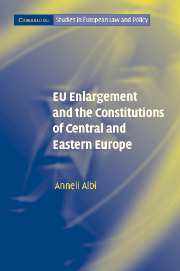Book contents
- Frontmatter
- Contents
- List of tables
- Series Editors' Preface
- Acknowledgements
- Table of cases
- Table of treaties, laws and other instruments
- List of abbreviations
- Introduction
- 1 Overview of the accession process
- 2 Constitutional adaptations in the ‘old’ Member States
- 3 Some idiosyncrasies of CEE constitutions
- 4 Constitutional issues in the pre-accession period
- 5 Revision of CEE constitutions for EU membership
- 6 Theoretical views of sovereignty and democratic legitimacy in CEE
- 7 Referendums
- 8 Membership of NATO and other international organisations
- 9 Role of Constitutional Courts
- 10 Implications of the European Constitution
- Epilogue: ‘Taking constitutions seriously’ in the process of European integration
- Bibliography
- Appendix
- Index
Epilogue: ‘Taking constitutions seriously’ in the process of European integration
Published online by Cambridge University Press: 28 July 2009
- Frontmatter
- Contents
- List of tables
- Series Editors' Preface
- Acknowledgements
- Table of cases
- Table of treaties, laws and other instruments
- List of abbreviations
- Introduction
- 1 Overview of the accession process
- 2 Constitutional adaptations in the ‘old’ Member States
- 3 Some idiosyncrasies of CEE constitutions
- 4 Constitutional issues in the pre-accession period
- 5 Revision of CEE constitutions for EU membership
- 6 Theoretical views of sovereignty and democratic legitimacy in CEE
- 7 Referendums
- 8 Membership of NATO and other international organisations
- 9 Role of Constitutional Courts
- 10 Implications of the European Constitution
- Epilogue: ‘Taking constitutions seriously’ in the process of European integration
- Bibliography
- Appendix
- Index
Summary
This book shows a remarkable journey of Central and Eastern European countries from regaining sovereignty to delegating part of it, a little more than a decade later, to one of the most highly integrated organisations in the world. While the constitutional lawyers in the ‘old’ Member States have had time to adapt incrementally to and absorb new steps of integration, the accession of the CEE countries represents a major ‘constitutional leap’, in the sense that they are joining at a time when the EU is preparing a Constitution which for many involves federal connotations. A central element of this ‘constitutional leap’ was the revision of the CEE constitutions, where the pouvoir constituant has entrenched a complex set of guarantees for sovereignty and independence. This proved a rather challenging and controversial exercise, resulting in most countries in minimal amendments prior to the accession referendums. Indeed, many of them have preferred to continue the amendment process in a politically more relaxed post-referendum environment, as well as in the light of new challenges posed by the European Constitution. Having explored throughout the book the complex and multifaceted process of constitutional revision, perhaps six broader conclusions could be drawn.
To start with, the constitutional developments both in the ‘old’ and ‘new’ Member States have raised the question about the role of national constitutions in the context of ever deeper integration.
- Type
- Chapter
- Information
- Publisher: Cambridge University PressPrint publication year: 2005



